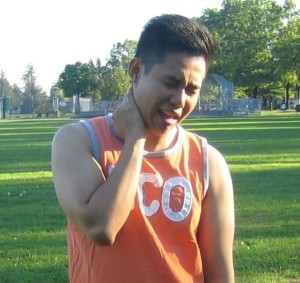Cervical disc herniation can be caused by wear and tear of the discs in the neck. As one starts to age, the discs lose some fluid that keeps them flexible.
A herniated disc can also occur from spinal injuries which causes small-sized tears or cracks in the exterior layer of the disc. The gel-like material within the disc might be driven out via the cracks or tears in the capsule which causes bulging of the discs or even breaking open or into fragments.
What are the indications of cervical disc herniation?
Cervical disc herniation can cause the following:
- Pain
- Numbness
- Weakness
A herniated disc can also occur from spinal injuries which causes small-sized tears or cracks in the exterior layer of the disc.
The neck is not the only part affected, but also the chest, shoulders, arms and hands. In some instances, a significant herniation in the neck can result to weakening or unusual stinging affecting other body parts including the legs.
How is it diagnosed?
The doctor will diagnose cervical disc herniation based on the symptoms and physical exam. In case the symptoms indicate a herniated disc, adequate rest and rehabilitation are recommended before further testing is carried out.
Management
In most cases, cervical disc herniation is initially managed with non-surgical measures such as rest or modified activities, exercises and medications to alleviate the pain and inflammation.
The doctor might refer the individual to a physiotherapist to be guided on exercises and techniques in protecting the neck as well as other treatment options such as traction. This involves mild, stable pulling on the head to extend the neck and enable the small-sized joints amid the neck bones to stretch out.
If the symptoms persist, the doctor might prescribe potent pain medications such as corticosteroids. The symptoms are expected to improve over time, but if the herniation is compressing the spinal cord or nerves along with constant pain, weakness or diminished control over the bowel or bladder, surgery is usually considered.

